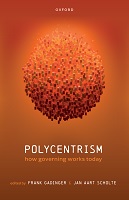Polycentrism
How Governing Works Today
Contributor(s)
Gadinger, Frank (editor)
Scholte, Jan Aart (editor)
Language
EnglishAbstract
How does governing work today? How does society (mis)handle pressing challenges such as armed violence, cultural difference, ecological degradation, economic restructuring, geopolitical shifts, global pandemics, migration flows, and technological change in ways that are democratic, effective, fair, peaceful, and sustainable? This book addresses this key question around the theme of ‘polycentrism’: i.e. the idea that contemporary governing is dispersed, fluctuating, messy, elusive, and headless. Chapters develop this notion of polycentrism from a broad spectrum of academic disciplines and theoretical approaches. Readers thereby obtain a full coverage of exciting new thinking about how today’s world is (mis)ruled. The book distinguishes four paradigms of knowledge about polycentric governing—organizational, legal, relational, structural—and pursues conversations across the divides that normally keep these approaches in separate research communities. These exceptional inter-paradigm exchanges focus especially on issues of techniques (how governing is done), power (what forces drive governing), and legitimacy (whether governing is rightful). Comparisons between the multiple perspectives on polycentric governing highlight, and help to clarify, the distinctive emphases, potentials, and limitations of each approach. In addition, combinations across the diverse theories generate promising novel avenues of thought about polycentrism. Through their engagement with the book, readers can develop their own understandings of governing today and thereby become more empowered political subjects.
Keywords
governance, governing, interdisciplinarity, legitimacy, methodology, polycentrism, power, techniquesDOI
10.1093/oso/9780192866837.001.0001ISBN
9780192866837Publisher
Oxford University PressPublisher website
https://global.oup.com/Publication date and place
Oxford, 2023Classification
Political structure and processes
Public administration


 Download
Download Web Shop
Web Shop